跳槽的好处与坏处英语文章
关于跳槽利弊的作文英语
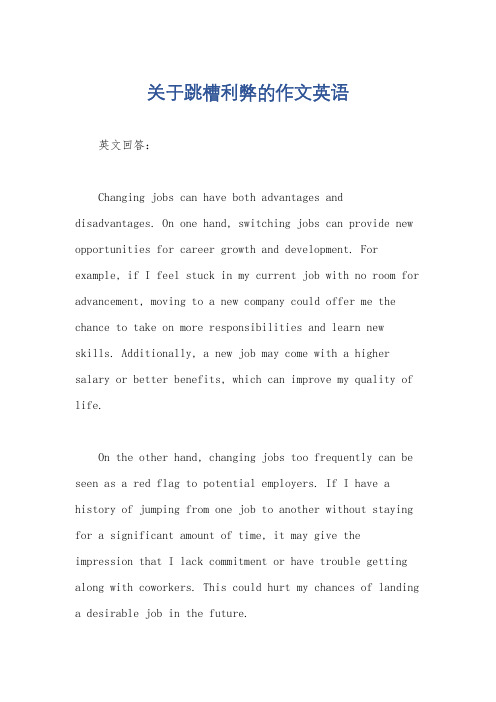
关于跳槽利弊的作文英语英文回答:Changing jobs can have both advantages and disadvantages. On one hand, switching jobs can provide new opportunities for career growth and development. For example, if I feel stuck in my current job with no room for advancement, moving to a new company could offer me the chance to take on more responsibilities and learn new skills. Additionally, a new job may come with a higher salary or better benefits, which can improve my quality of life.On the other hand, changing jobs too frequently can be seen as a red flag to potential employers. If I have a history of jumping from one job to another without staying for a significant amount of time, it may give the impression that I lack commitment or have trouble getting along with coworkers. This could hurt my chances of landing a desirable job in the future.Furthermore, starting a new job can be stressful and time-consuming. I would have to go through the process of applying, interviewing, and training all over again, which can be exhausting. It may also take some time to adjust toa new work environment and build relationships with new colleagues.In conclusion, while changing jobs can be beneficialfor career growth and financial gain, it is important to consider the potential drawbacks as well. It is essentialto weigh the pros and cons before making a decision to switch jobs.中文回答:跳槽有利有弊。
跳槽的好处和坏处英语作文

跳槽的好处和坏处英语作文The Pros and Cons of Job Hopping.In today's fast-paced and constantly evolving business world, job hopping, or the practice of switching jobs frequently, has become increasingly common. While some view job hopping as a necessary evil to progress their careers, others argue that it can have negative consequences. This essay delves into the advantages and disadvantages of job hopping, examining both sides of the coin.Advantages of Job Hopping.1. Career Growth and Development.Job hopping often exposes individuals to a variety of work environments, industries, and job roles. This diverse experience allows individuals to develop a broader skill set and gain exposure to different business practices and cultures. Such exposure often leads to career growth andpersonal development, as individuals are constantly challenged to adapt to new situations and learn new things.2. Better Compensation and Benefits.Job hopping can also lead to better compensation and benefits. As individuals switch jobs, they often negotiate higher salaries and better perks, reflecting theirincreased value and experience. This can lead to asignificant improvement in their overall financial situation.3. Network Expansion.Each new job brings with it a new network of colleagues, mentors, and industry contacts. Job hopping allows individuals to expand their professional networks, increasing their chances of finding better job opportunities, learning about new trends, and accessing valuable resources.4. Avoiding Stagnation.In some cases, staying in the same job for too long can lead to stagnation. Job hopping allows individuals to avoid this by constantly seeking new challenges and opportunities for growth. This constant seeking and achieving of new goals can lead to a more fulfilling and rewarding career.Disadvantages of Job Hopping.1. Lack of Long-Term Commitment.Frequent job hopping can give the impression of a lack of commitment to both the company and the role. This can affect an individual's reputation and credibility, making them appear unreliable or unfocused.2. Disruption to Career Development.Constantly switching jobs can disrupt career development. Building a successful career often requires time and effort to establish oneself in a particular industry or role. Job hopping can prevent individuals fromfully realizing their potential in a given field.3. Lower Job Security.Job hopping can lead to job insecurity. With each new job, there is always the risk of being let go due to various reasons such as poor performance, company restructuring, or changes in management. This constant flux can lead to stress and anxiety for individuals and their families.4. Limited Time for Integration.Each new job requires time and effort to integrate into the team, understand the company culture, and learn new processes and procedures. Job hopping can limit this integration time, preventing individuals from fully understanding and contributing to their new work environment.In conclusion, job hopping has both advantages and disadvantages. It can lead to career growth, bettercompensation, expanded networks, and avoidance of stagnation. However, it can also lead to a lack of commitment, disrupted career development, job insecurity, and limited integration time. The decision to job hop should be carefully weighed based on personal goals, career aspirations, and the overall job market.。
跳槽是否有利于职业发展英语作文
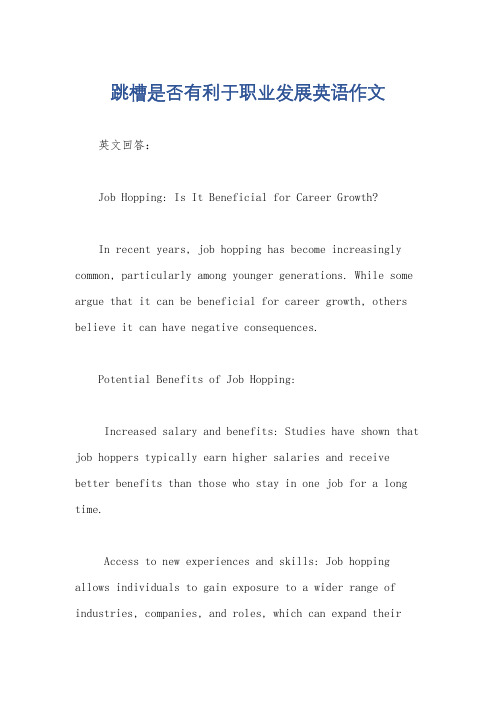
跳槽是否有利于职业发展英语作文英文回答:Job Hopping: Is It Beneficial for Career Growth?In recent years, job hopping has become increasingly common, particularly among younger generations. While some argue that it can be beneficial for career growth, others believe it can have negative consequences.Potential Benefits of Job Hopping:Increased salary and benefits: Studies have shown that job hoppers typically earn higher salaries and receive better benefits than those who stay in one job for a long time.Access to new experiences and skills: Job hopping allows individuals to gain exposure to a wider range of industries, companies, and roles, which can expand theirskillset and make them more marketable.Career advancement: Job hopping can provide opportunities for rapid career advancement, as it allows individuals to move into more senior roles more quickly.Personal growth: Job hopping can challenge individuals to step outside their comfort zones, develop new perspectives, and grow both professionally and personally.Potential Drawbacks of Job Hopping:Loss of institutional knowledge: When employees leave, they take their knowledge and experience with them. This can create a gap in institutional knowledge, which can be detrimental to companies.Negative perceptions: Job hopping can be seen negatively by some employers, who may perceive it as a lack of commitment or stability.Career setbacks: Job hopping can lead to setbacks ifindividuals are not careful in their choices. They may end up in roles that are not a good fit or that do not provide opportunities for growth.Damage to relationships: Job hopping can damage relationships with colleagues, managers, and clients, as individuals may be perceived as unreliable or disloyal.Conclusion:Whether or not job hopping is beneficial for career growth depends on individual circumstances and career goals. While it can provide numerous benefits, it is important to weigh the potential drawbacks and make informed decisions. Individuals should carefully consider their long-termcareer aspirations, their skills and experience, and thejob market before making the decision to hop jobs.中文回答:跳槽是否有利于职业发展?近年来,跳槽变得越来越普遍,尤其是在年轻一代中。
关于跳槽的利和弊英语作文
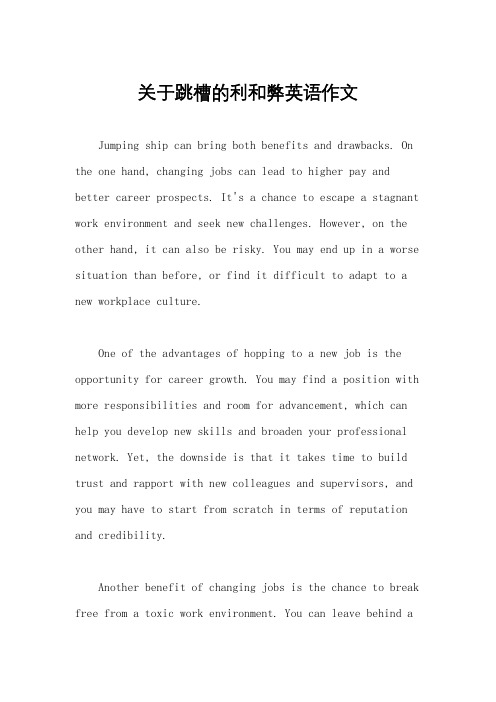
关于跳槽的利和弊英语作文Jumping ship can bring both benefits and drawbacks. On the one hand, changing jobs can lead to higher pay and better career prospects. It's a chance to escape a stagnant work environment and seek new challenges. However, on the other hand, it can also be risky. You may end up in a worse situation than before, or find it difficult to adapt to a new workplace culture.One of the advantages of hopping to a new job is the opportunity for career growth. You may find a position with more responsibilities and room for advancement, which can help you develop new skills and broaden your professional network. Yet, the downside is that it takes time to build trust and rapport with new colleagues and supervisors, and you may have to start from scratch in terms of reputation and credibility.Another benefit of changing jobs is the chance to break free from a toxic work environment. You can leave behind adifficult boss, uncooperative coworkers, or a company with a poor reputation. However, the grass is not always greener on the other side. You might encounter similar problems in your new job, or even face unexpected challenges that you hadn't anticipated.Moreover, switching jobs can provide a fresh start and renewed motivation. It's a chance to pursue your passions and find a job that aligns with your values and interests. Nonetheless, the downside is that it can be emotionally taxing to constantly adapt to new surroundings andestablish yourself in a different workplace. It may take a toll on your mental well-being and work-life balance.In conclusion, jumping ship can offer the potential for higher pay, career growth, and a fresh start, but it also comes with the risk of ending up in a worse situation, struggling to adapt, or facing similar challenges. It's a decision that requires careful consideration of the potential benefits and drawbacks.。
跳槽的利弊英语作文
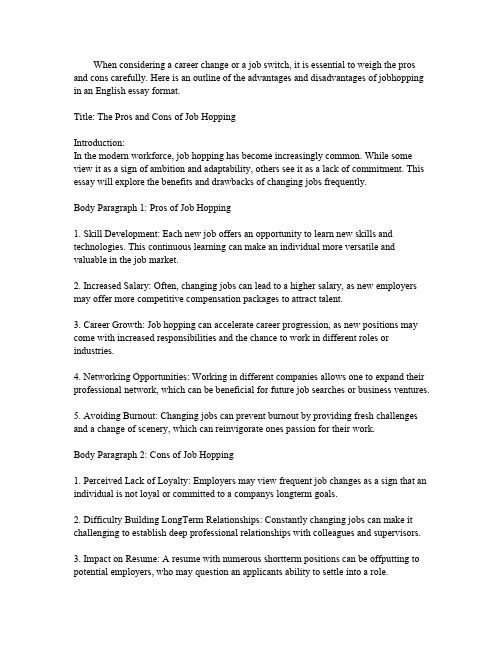
When considering a career change or a job switch,it is essential to weigh the pros and cons carefully.Here is an outline of the advantages and disadvantages of jobhopping in an English essay format.Title:The Pros and Cons of Job HoppingIntroduction:In the modern workforce,job hopping has become increasingly common.While some view it as a sign of ambition and adaptability,others see it as a lack of commitment.This essay will explore the benefits and drawbacks of changing jobs frequently.Body Paragraph1:Pros of Job Hopping1.Skill Development:Each new job offers an opportunity to learn new skills and technologies.This continuous learning can make an individual more versatile and valuable in the job market.2.Increased Salary:Often,changing jobs can lead to a higher salary,as new employers may offer more competitive compensation packages to attract talent.3.Career Growth:Job hopping can accelerate career progression,as new positions may come with increased responsibilities and the chance to work in different roles or industries.working Opportunities:Working in different companies allows one to expand their professional network,which can be beneficial for future job searches or business ventures.5.Avoiding Burnout:Changing jobs can prevent burnout by providing fresh challenges and a change of scenery,which can reinvigorate ones passion for their work.Body Paragraph2:Cons of Job Hopping1.Perceived Lack of Loyalty:Employers may view frequent job changes as a sign that an individual is not loyal or committed to a companys longterm goals.2.Difficulty Building LongTerm Relationships:Constantly changing jobs can make it challenging to establish deep professional relationships with colleagues and supervisors.3.Impact on Resume:A resume with numerous shortterm positions can be offputting to potential employers,who may question an applicants ability to settle into a role.4.Stability Issues:Job hopping can lead to a lack of job security and financial stability,as there is often a period of unemployment between positions.5.Cultural Adjustment:Each new job requires adjustment to a new company culture, which can be exhausting and timeconsuming.Conclusion:In conclusion,job hopping has both its merits and pitfalls.While it can offer opportunities for rapid skill acquisition,salary increases,and career advancement,it also comes with the risk of being perceived as uncommitted and the potential for instability. Ultimately,the decision to job hop should be made with careful consideration of ones career goals,personal circumstances,and the specific opportunities presented by each new position.。
跳槽的利弊 英文作文
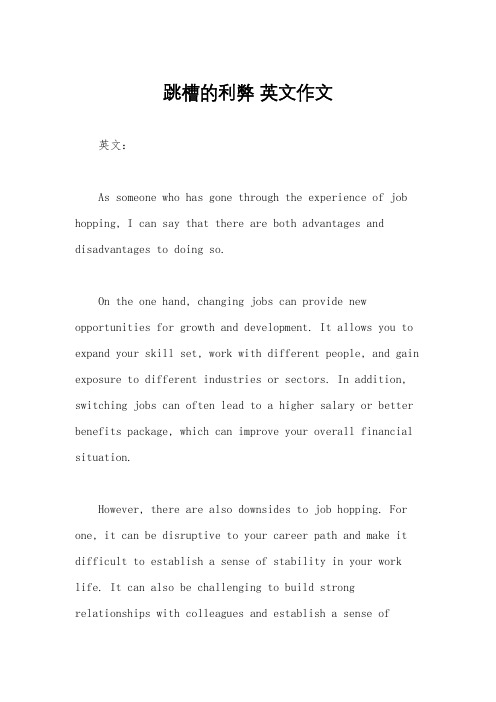
跳槽的利弊英文作文英文:As someone who has gone through the experience of job hopping, I can say that there are both advantages and disadvantages to doing so.On the one hand, changing jobs can provide new opportunities for growth and development. It allows you to expand your skill set, work with different people, and gain exposure to different industries or sectors. In addition, switching jobs can often lead to a higher salary or better benefits package, which can improve your overall financial situation.However, there are also downsides to job hopping. For one, it can be disruptive to your career path and make it difficult to establish a sense of stability in your work life. It can also be challenging to build strong relationships with colleagues and establish a sense ofloyalty to a particular company. Additionally, frequent job changes can raise red flags for potential employers, who may view you as unreliable or lacking commitment.Ultimately, the decision to change jobs should be based on a careful evaluation of your personal and professional goals, as well as the potential benefits and drawbacks of making a move.中文:作为一个经历过跳槽经历的人,我可以说,这么做有利有弊。
跳槽的好处与坏处英语文章

跳槽的好处与坏处英语文章-CAL-FENGHAI-(2020YEAR-YICAI)_JINGBIANAdvantage1.the youngsters are more likely to have a better knowledge of other fields and then to expand their horizons. Moreover, changing jobs frequently offers workers a chance to move up to a better position.2.It may offer them a broader space for career developmen t. When people join a company,the new working environment,new colleagues and new enterprise cultural atmosphere will definitely motivate their enthusiasm for the new job and thus, prompt their career to a new level.3.Unfortunately, it s an antiquated concept that might have beenvalid long ago, but in today s volatile talent marketplace, automatically rejecting frequent job changers may cause you to miss out on many exceptional hires. Rather than the often-mistaken assumption that job hoppers are disloyal, selfish, impatient, and expensive, they may actually be superstars who merely change jobs frequently because they are so good, and they are continually offered many new and higher-level opportunities (that their current firm simply cannot or wonnot match). There is no available public datathat demonstra。
跳槽的利弊英语作文
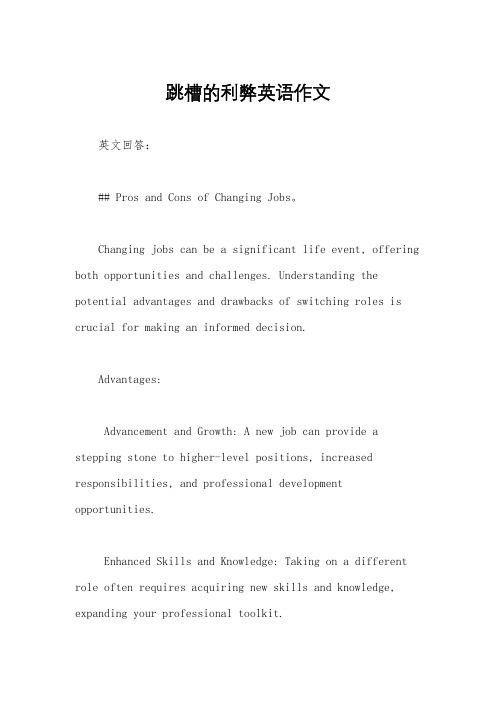
跳槽的利弊英语作文英文回答:## Pros and Cons of Changing Jobs。
Changing jobs can be a significant life event, offering both opportunities and challenges. Understanding the potential advantages and drawbacks of switching roles is crucial for making an informed decision.Advantages:Advancement and Growth: A new job can provide a stepping stone to higher-level positions, increased responsibilities, and professional development opportunities.Enhanced Skills and Knowledge: Taking on a different role often requires acquiring new skills and knowledge, expanding your professional toolkit.Increased Compensation: Switching jobs often leads to a salary increase, as companies value the experience and capabilities you bring.Improved Work Environment: A new job can offer a more positive and engaging work environment, fostering better relationships with colleagues and managers.New Challenges: Embracing new challenges can reinvigorate your career, reignite your passion for work, and prevent stagnation.Disadvantages:Financial Risk: Changing jobs may involve a temporary loss of income during the transition, potentially impacting your financial situation.Uncertainty and Stress: Starting a new job can be stressful, requiring time to adjust to a different organizational culture, workload, and expectations.Loss of Benefits: Leaving your current job may result in losing valuable benefits, such as health insurance, retirement contributions, or paid time off.Commuting and Relocation: A new job may require a longer commute or even relocation, potentially affecting your work-life balance and lifestyle.Competition: The job market can be competitive, and finding a suitable replacement role may take time and effort.中文回答:## 跳槽的利弊。
跳槽的优势与劣势英语作文
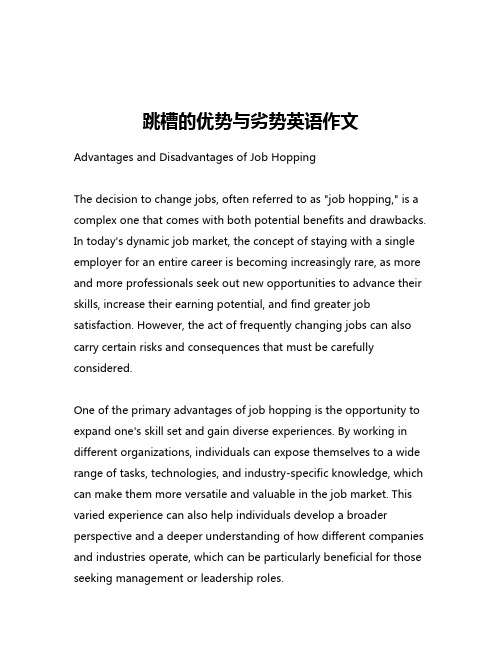
跳槽的优势与劣势英语作文Advantages and Disadvantages of Job HoppingThe decision to change jobs, often referred to as "job hopping," is a complex one that comes with both potential benefits and drawbacks. In today's dynamic job market, the concept of staying with a single employer for an entire career is becoming increasingly rare, as more and more professionals seek out new opportunities to advance their skills, increase their earning potential, and find greater job satisfaction. However, the act of frequently changing jobs can also carry certain risks and consequences that must be carefully considered.One of the primary advantages of job hopping is the opportunity to expand one's skill set and gain diverse experiences. By working in different organizations, individuals can expose themselves to a wide range of tasks, technologies, and industry-specific knowledge, which can make them more versatile and valuable in the job market. This varied experience can also help individuals develop a broader perspective and a deeper understanding of how different companies and industries operate, which can be particularly beneficial for those seeking management or leadership roles.Another advantage of job hopping is the potential for increased earning potential. When individuals change jobs, they often have the opportunity to negotiate higher salaries or more favorable compensation packages, as employers are often willing to offer competitive pay to attract top talent. This can be especially true for those who have developed specialized skills or expertise that are in high demand. Additionally, job hopping can provide a way for individuals to quickly advance their careers and reach higher levels of responsibility and compensation than they might have been able to achieve by staying with a single employer.Job hopping can also lead to greater job satisfaction and personal fulfillment. By exploring different work environments and organizational cultures, individuals can find a better fit for their values, work style, and career aspirations. This can result in increased motivation, engagement, and overall job satisfaction, which can have a positive impact on an individual's well-being and productivity.However, there are also significant drawbacks to job hopping that must be considered. One of the primary disadvantages is the potential for employers to view frequent job changes as a lack of loyalty or commitment. Some employers may be hesitant to invest time and resources in training and developing employees who they perceive as being prone to leaving the organization after a shortperiod of time. This can make it more difficult for job hoppers to secure stable employment or to advance within a particular organization.Another potential downside of job hopping is the disruption it can cause to an individual's career trajectory and professional development. Frequent job changes can make it challenging to establish a clear and coherent career path, as individuals may find themselves constantly starting over in new roles and organizations. This can make it more difficult to build a strong professional network, gain deep expertise in a particular field, or demonstrate long-term commitment to a specific career path.Job hopping can also have financial implications, as individuals may face the loss of benefits, such as retirement contributions or stock options, when they leave an organization. Additionally, the costs associated with job searches, relocation, and the potential for periods of unemployment can add up quickly, particularly for those who change jobs frequently.Finally, job hopping can also have a negative impact on an individual's work-life balance and personal relationships. The constant need to adapt to new work environments, build new professional relationships, and navigate the challenges of starting a new job can be emotionally and physically draining, leaving littletime and energy for personal pursuits and family life.In conclusion, the decision to job hop is a complex one that requires careful consideration of the potential benefits and drawbacks. While job hopping can offer opportunities for professional growth, increased earning potential, and greater job satisfaction, it also carries risks in terms of job security, career development, financial stability, and work-life balance. Ultimately, the decision to change jobs should be based on a thorough evaluation of an individual's career goals, personal circumstances, and the specific opportunities available in the job market.。
跳槽的利与弊专八英语作文
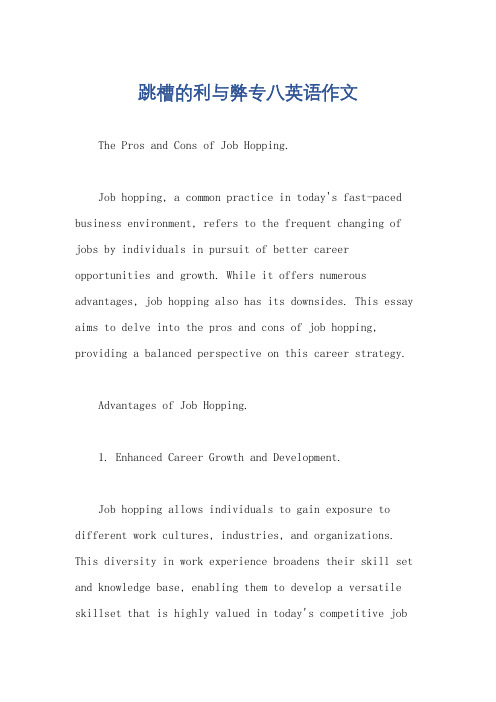
跳槽的利与弊专八英语作文The Pros and Cons of Job Hopping.Job hopping, a common practice in today's fast-paced business environment, refers to the frequent changing of jobs by individuals in pursuit of better career opportunities and growth. While it offers numerous advantages, job hopping also has its downsides. This essay aims to delve into the pros and cons of job hopping, providing a balanced perspective on this career strategy.Advantages of Job Hopping.1. Enhanced Career Growth and Development.Job hopping allows individuals to gain exposure to different work cultures, industries, and organizations. This diversity in work experience broadens their skill set and knowledge base, enabling them to develop a versatile skillset that is highly valued in today's competitive jobmarket. Frequent job changes also provide opportunities for career advancement, as individuals can leverage their previous experience to secure higher-level positions.2. Increased Financial Rewards.Job hopping often leads to higher financial rewards. As individuals gain more experience and expertise, they become eligible for higher salaries and better compensation packages. Additionally, job hopping can also lead to bonuses, stock options, and other incentives that are often not available in a single organization.3. Expanded Network and Opportunities.By moving between different organizations, individuals have the opportunity to build a wide network of professional contacts. This expanded network can provide access to new opportunities, such as job leads, business partnerships, and industry insights. These opportunities can further enhance career growth and success.4. Reduced Risk of Stagnation.Job hopping helps individuals avoid stagnation and boredom in their careers. By constantly seeking new challenges and opportunities, they can stay engaged and motivated, leading to higher job satisfaction and performance.Disadvantages of Job Hopping.1. Lack of Long-Term Commitment.Frequent job hopping can raise questions about an individual's commitment and loyalty to their employer. This can affect their reputation within the industry and may limit their chances of securing long-term positions or senior-level roles.2. Disruption in Career Progression.Constantly switching jobs can lead to a disjointed career path, making it difficult to demonstrate a clearpattern of progression and achievement. This can affect an individual's credibility and may hinder their chances of securing promotions or better job opportunities.3. Limited Time for Settlement and Growth.Job hopping often results in individuals spending limited time in each organization. This can limit their opportunities to settle in, understand the organization's culture and values, and fully develop their skills and capabilities.4. Increased Stress and Uncertainty.Constantly searching for new jobs and undergoing the interview process can be stressful and uncertain. It may also require individuals to relocate frequently, leading to disrupted personal lives and increased financial burden.In conclusion, job hopping has both advantages and disadvantages. It offers opportunities for enhanced career growth, financial rewards, and expanded networks, but alsocomes with risks of stagnation, disrupted career progression, and increased stress. Therefore, individuals should carefully consider their career goals and preferences before deciding whether job hopping is the right strategy for them.。
跳槽的好坏英语作文
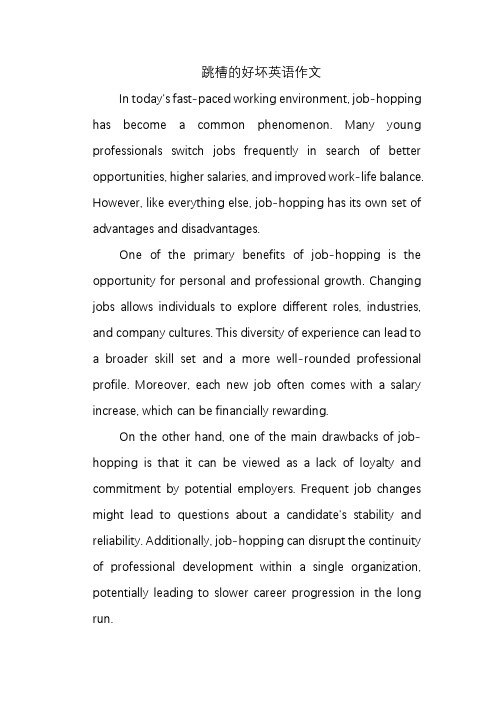
跳槽的好坏英语作文In today's fast-paced working environment, job-hopping has become a common phenomenon. Many young professionals switch jobs frequently in search of better opportunities, higher salaries, and improved work-life balance. However, like everything else, job-hopping has its own set of advantages and disadvantages.One of the primary benefits of job-hopping is the opportunity for personal and professional growth. Changing jobs allows individuals to explore different roles, industries, and company cultures. This diversity of experience can lead to a broader skill set and a more well-rounded professional profile. Moreover, each new job often comes with a salary increase, which can be financially rewarding.On the other hand, one of the main drawbacks of job-hopping is that it can be viewed as a lack of loyalty and commitment by potential employers. Frequent job changes might lead to questions about a candidate's stability and reliability. Additionally, job-hopping can disrupt the continuity of professional development within a single organization, potentially leading to slower career progression in the long run.Another advantage is that job-hopping can provide a quick escape from a toxic work environment or a dead-end job. It gives individuals the power to take control of their career paths and make decisions that align with their personal values and career goals.Yet, a potential disadvantage is that it may result in a weaker professional network. Building strong relationships with colleagues takes time, and frequent job changes can hinder the development of these important connections. Also, benefits such as pensions and long-term bonuses are often tied to the length of service, which job-hoppers might miss out on.In conclusion, job-hopping can be a double-edged sword. It offers growth, new challenges, and financial rewards, but it can also lead to perceptions of inconsistency and weakened professional networks. Therefore, individuals should weigh the pros and cons carefully before deciding to switch jobs.中文翻译:在当今快节奏的工作环境中,跳槽已成为一种常见现象。
跳槽的利弊英语作文
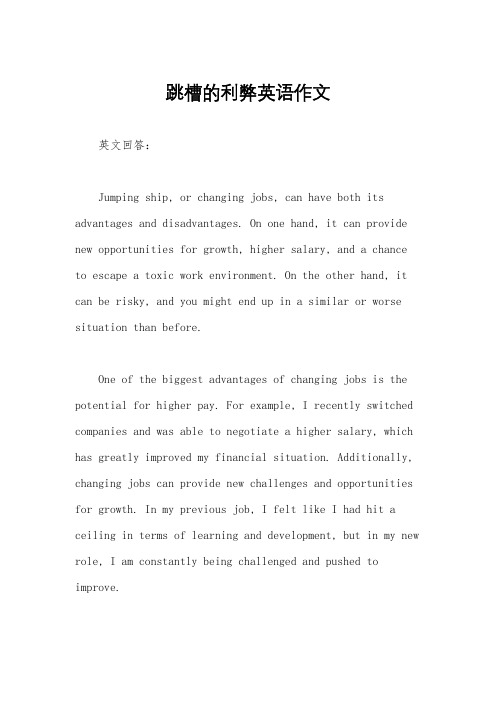
跳槽的利弊英语作文英文回答:Jumping ship, or changing jobs, can have both its advantages and disadvantages. On one hand, it can provide new opportunities for growth, higher salary, and a chance to escape a toxic work environment. On the other hand, it can be risky, and you might end up in a similar or worse situation than before.One of the biggest advantages of changing jobs is the potential for higher pay. For example, I recently switched companies and was able to negotiate a higher salary, which has greatly improved my financial situation. Additionally, changing jobs can provide new challenges and opportunities for growth. In my previous job, I felt like I had hit a ceiling in terms of learning and development, but in my new role, I am constantly being challenged and pushed to improve.However, there are also downsides to jumping ship. For one, it can be emotionally taxing to leave behindcolleagues and a familiar work environment. Additionally, there is always a risk that the grass is not always greener on the other side. I have a friend who changed jobs for a higher salary, only to find that the new company had atoxic work culture and she was miserable.In conclusion, changing jobs can have its pros and cons. It's important to carefully weigh the potential benefits against the risks before making a decision.中文回答:跳槽,或者换工作,既有利也有弊。
跳槽的好坏英语作文

跳槽的好坏英语作文The Pros and Cons of Job HoppingIn today's job market, job hopping has become a common phenomenon. There are both advantages and disadvantages to this trend.One of the main benefits of job hopping is the potential for increased salary and career advancement. By moving to a new company, one might be offered a higher salary or a more senior position that was not available in the previous job. It also allows individuals to gain diverse experiences and skills by working in different environments and industries. This can make them more versatile and competitive in the job market.Another advantage is that it gives people the opportunity to explore their interests and find a job that truly aligns with their passions and long-term career goals. Sometimes, staying in one job for too long can limit one's perspective and prevent them from discovering better opportunities.However, there are also drawbacks to job hopping. Frequent job changes can make employers question an applicant's loyalty and stability. It might give the impression that the person is unable to commit to a job or handle challenges. Additionally, constantly changing jobs means constantly adjusting to new work cultures and teams, which can be stressful and time-consuming.Moreover, building strong professional relationships and networks takes time, and job hopping too often can disrupt this process. It may also result in missed opportunities for promotions or career growth within a single company if one leaves too soon.In conclusion, job hopping can have its advantages in terms of career growth and exploration, but it also comes with certain risks and challenges. It is important for individuals to carefully consider their motivations and the potential consequences before making the decision to change jobs.。
评论跳槽好还是不好的英文作文
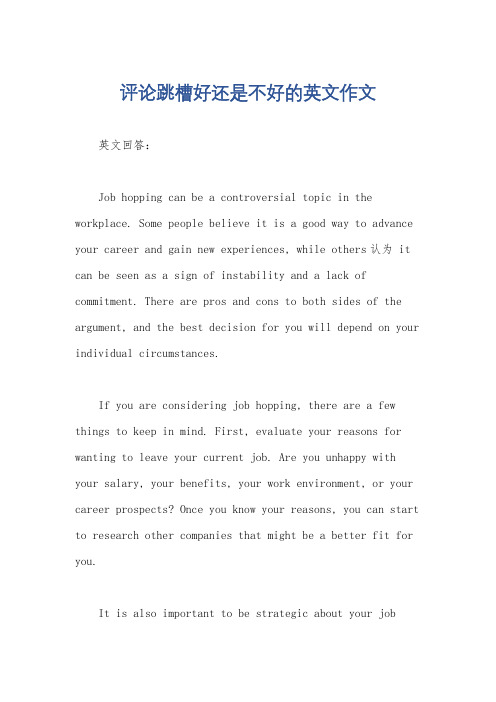
评论跳槽好还是不好的英文作文英文回答:Job hopping can be a controversial topic in the workplace. Some people believe it is a good way to advance your career and gain new experiences, while others认为 it can be seen as a sign of instability and a lack of commitment. There are pros and cons to both sides of the argument, and the best decision for you will depend on your individual circumstances.If you are considering job hopping, there are a few things to keep in mind. First, evaluate your reasons for wanting to leave your current job. Are you unhappy with your salary, your benefits, your work environment, or your career prospects? Once you know your reasons, you can start to research other companies that might be a better fit for you.It is also important to be strategic about your jobhopping. Don't just quit your job without having another one lined up. Make sure you have a solid plan and that you are financially prepared to be out of work for a period of time.If you are able to successfully job hop, there are a number of potential benefits. You can increase your salary, gain new skills and experiences, and advance your career more quickly. However, there are also some risks to consider. Job hopping can be seen as a sign of instability, and it can make it difficult to build long-term relationships with colleagues and clients.Ultimately, the decision of whether or not to job hopis a personal one. There is no right or wrong answer, and the best decision for you will depend on your individual circumstances. If you are considering job hopping, be sure to weigh the pros and cons carefully and make a decision that is right for you.中文回答:跳槽的好处:提高薪酬,跳槽可以帮助你获得更高的薪酬待遇。
跳槽优缺点英语作文
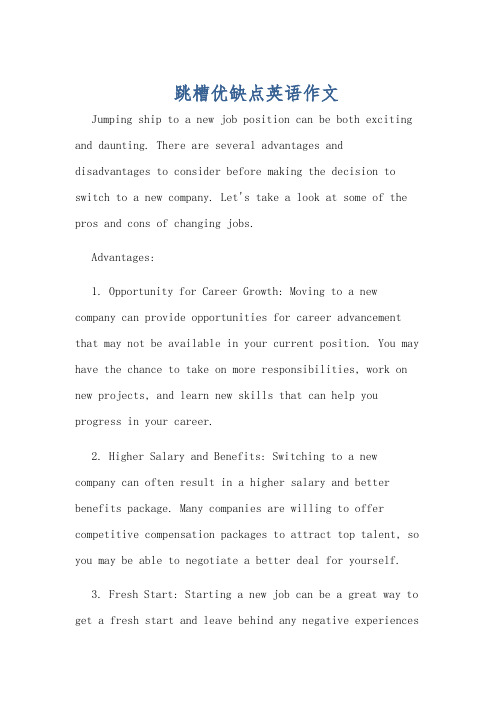
跳槽优缺点英语作文Jumping ship to a new job position can be both exciting and daunting. There are several advantages and disadvantages to consider before making the decision to switch to a new company. Let's take a look at some of the pros and cons of changing jobs.Advantages:1. Opportunity for Career Growth: Moving to a new company can provide opportunities for career advancement that may not be available in your current position. You may have the chance to take on more responsibilities, work on new projects, and learn new skills that can help you progress in your career.2. Higher Salary and Benefits: Switching to a new company can often result in a higher salary and better benefits package. Many companies are willing to offer competitive compensation packages to attract top talent, so you may be able to negotiate a better deal for yourself.3. Fresh Start: Starting a new job can be a great way to get a fresh start and leave behind any negative experiencesor challenges you may have encountered in your current role. You'll have the opportunity to make new connections, build new relationships, and create a new professional identity.4. New Challenges and Opportunities: Joining a new company can expose you to new challenges and opportunities that can help you grow professionally. You may have the chance to work on different projects, collaborate with new colleagues, and expand your skill set.Disadvantages:1. Uncertainty: Changing jobs can bring a sense of uncertainty about the new company, its culture, and the people you'll be working with. It can be challenging to adapt to a new environment and establish yourself within a different organizational structure.2. Loss of Benefits and Seniority: When you leave your current job, you may lose certain benefits such as vacation time, retirement contributions, and healthcare coverage. Additionally, you'll also have to start over in terms of seniority and building relationships within the new company.3. Adjustment Period: It takes time to adjust to a new job and get acclimated to the company's culture, policies, and procedures. You may experience a learning curve as you adapt to the new role, which can be stressful and overwhelming at times.4. Risk of Change: There's always a risk associated with making a job change. You may not have a clear understanding of what to expect in the new role, and there's apossibility that it may not meet your expectations or align with your career goals.中文:跳槽到新的工作岗位可能既令人兴奋又令人畏惧。
跳槽到底是好是坏英语作文
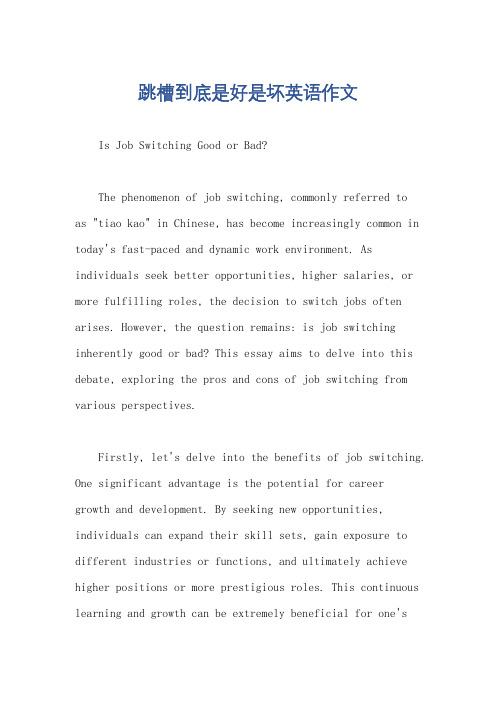
跳槽到底是好是坏英语作文Is Job Switching Good or Bad?The phenomenon of job switching, commonly referred toas "tiao kao" in Chinese, has become increasingly common in today's fast-paced and dynamic work environment. As individuals seek better opportunities, higher salaries, or more fulfilling roles, the decision to switch jobs often arises. However, the question remains: is job switching inherently good or bad? This essay aims to delve into this debate, exploring the pros and cons of job switching from various perspectives.Firstly, let's delve into the benefits of job switching. One significant advantage is the potential for careergrowth and development. By seeking new opportunities, individuals can expand their skill sets, gain exposure to different industries or functions, and ultimately achieve higher positions or more prestigious roles. This continuous learning and growth can be extremely beneficial for one'scareer trajectory.Moreover, job switching can also lead to better financial rewards. In many cases, individuals switch jobs to secure a higher salary or better compensation package. This increase in income can provide a better quality of life, allow for more savings, or even facilitate career changes into more fulfilling fields.Additionally, job switching can offer a fresh start and new challenges. Sometimes, individuals may feel stagnated or unfulfilled in their current roles. By switching jobs, they can escape from such situations, embark on new adventures, and pursue their passions and interests. This change can be refreshing and invigorating, leading to increased motivation and engagement at work.However, while job switching may offer numerous benefits, it also has its downsides. One significant drawback is the loss of job security and stability. Switching jobs frequently can affect one's careercontinuity and make it difficult to establish a solidfoundation within an industry or organization. This instability can lead to career uncertainty and a lack of trust from employers, potentially limiting future opportunities.Moreover, job switching also involves significant costs and risks. Switching to a new job often requiresindividuals to relocate, which can be expensive and disruptive. There is also the risk of not finding asuitable job immediately after leaving the previous one, leading to a period of unemployment and financial strain. Furthermore, adapting to a new work environment, team, and culture can be challenging and time-consuming.Additionally, job switching may not always lead tobetter opportunities. In some cases, individuals may switch jobs for reasons such as dissatisfaction with their current role or a lack of career development opportunities. However, if they fail to carefully assess their career goals and values before switching, they may end up in a similar or even worse situation. Therefore, it is crucial to make informed decisions and carefully evaluate potentialopportunities before taking the plunge.In conclusion, job switching can be both good and bad, depending on the context and individual circumstances. It offers the potential for career growth, better financial rewards, and new challenges. However, it also involves risks, costs, and the loss of job security and stability. Therefore, when considering job switching, individuals should carefully assess their career goals, values, and the potential benefits and costs involved. By making informed decisions, they can ensure that job switching serves as a positive step towards achieving their career aspirations.。
跳槽的利弊英语作文(3篇)
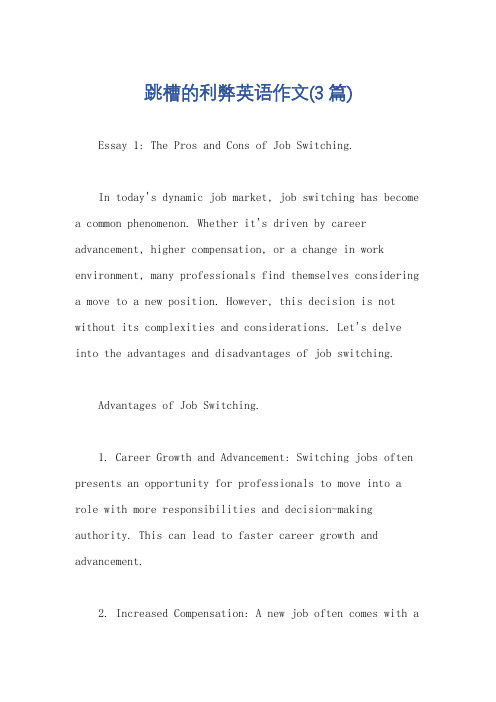
跳槽的利弊英语作文(3篇)Essay 1: The Pros and Cons of Job Switching.In today's dynamic job market, job switching has become a common phenomenon. Whether it's driven by career advancement, higher compensation, or a change in work environment, many professionals find themselves considering a move to a new position. However, this decision is not without its complexities and considerations. Let's delve into the advantages and disadvantages of job switching.Advantages of Job Switching.1. Career Growth and Advancement: Switching jobs often presents an opportunity for professionals to move into a role with more responsibilities and decision-making authority. This can lead to faster career growth and advancement.2. Increased Compensation: A new job often comes with ahigher salary and better compensation packages. This is a significant motivation for many professionals who are seeking to improve their financial standing.3. Learning New Skills and Knowledge: Every organization has its unique way of doing things. By switching jobs, professionals have the opportunity to learn new skills, methods, and technologies that can broadentheir knowledge base and enhance their market value.4. Improved Work-Life Balance: Sometimes, a change in job can lead to a more.。
- 1、下载文档前请自行甄别文档内容的完整性,平台不提供额外的编辑、内容补充、找答案等附加服务。
- 2、"仅部分预览"的文档,不可在线预览部分如存在完整性等问题,可反馈申请退款(可完整预览的文档不适用该条件!)。
- 3、如文档侵犯您的权益,请联系客服反馈,我们会尽快为您处理(人工客服工作时间:9:00-18:30)。
Advantageyoungsters are more likely to have a better knowledge of other fields and then to expand their horizons. Moreover, changing jobs frequently offers workers a chance to move up to a better position.may offer them a broader space for career developmen t. When people join a company,the new working environment,new colleagues and new enterprise cultural atmosphere will definitely motivate their enthusiasm for the new job and thus, prompt their career to a new level., it s an antiquated concept that might have been valid long ago, but in today s volatile talent marketplace, automatically rejecting frequent job changers may cause you to miss out on many exceptional hires. Rather than the often-mistaken assumption that job hoppers are disloyal, selfish, impatient, and expensive, they may actually be superstars who merely change jobs frequently because they are so good, and they are continually offered many new and higher-level opportunities(that their current firm simply cannot or wonnot match). There is no available public data that demonstra。
不幸的是,这是一个过时的概念,可能在很久以前就已经存在了,但在如今这个多变的人才市场,自动拒绝频繁换工作的人可能会让你错过许多优秀的员工。
他们可能实际上是超级巨星,因为他们太好了,而且他们不断地被提供许多新的和更高层次的机会(他们现在的公司根本就不可能配的上他),而不是经常错误地认为他们是不忠诚、自私、缺乏耐心和昂贵的。
the salary the opportunitySalary IncreaseThe average raise in the United States is now a dismal % of annual salary, meaning the longer you stick around in one place the further behind market rate you will fall. One benefit of moving on to a new company is the potential increase in pay. It's important to negotiate salary when accepting a new job. Payscale suggests those who switch can reasonably expect a 10 or 20% increase in pay.好处--加薪现在美国的平均工资水平是每年工资的%,这意味着你在一个地方呆的时间越长,你就会越落后。
向新公司转移的一个好处是潜在的工资增长。
在接受一份新工作时,谈薪水是很重要的。
Payscale建议,那些转换的人可以合理地预计工资会增加10%到20%。
Career AdvancementWhile it's true that companies prefer to promote from within, the amount of time it takes to get promoted is often less for job hoppers. Companies often want to keeprole. Because of this, it's sometimes easier to hire a manager from outside rather than shuffle(洗牌、搅乱、蒙混) the pieces of promoting from within and finding a replacement for junior level employees.虽然企业更喜欢从内部提拔,但获得晋升所需的时间往往更少。
如果公司在当前的职位上表现出色,公司往往会想留住员工。
正因为如此,从外部聘请一位经理,,比从内部提拔员工并为初级员工寻找替代人选,会更容易。
Varietyor complacency.(自满) One benefit of switching jobs is getting to experience a new environment and meet new people. No matter how experienced you are, it's unlikely you know everything about a different company's history and processes. Taking a new role can be an exciting way to broaden your perspective and learn new things. 很多人喜欢把事情混在一起,以避免无聊或自满。
换工作的一个好处就是能体验一个新的环境,结识新朋友。
不管你有多有经验,你都不太可能了解公司的历史和流程。
扮演一个新的角色可以是一个让你拓宽视野、学习新事物的令人兴奋的方法。
Growing Your Personal NetworkIn any line of work the relationships you build are important. By moving from one place to the next you get to meet a lot of people. As your network expands it's easier to leverage your time by seeking advice from experts. Another place this helps is finding yet another job down the line.在任何工作中,你所建立的关系都很重要。
从一个地方搬到另一个地方,你就会遇到很多人。
随着你的关系网的扩展,你可以通过专家的建议来利用你的时间。
另一个有用的地方是找到另一份工作。
Adaptability and GrowthIn my case, I've worked in a number of different industries and been successful in each of them. I've gained a wide breadth of knowledge and experience and built many skills in a short period of time. The frequency of change requires me to be versatilebuilding competence once and growing comfortable in my role, I have to constantly rebuild myself and tackle ever larger challenges.好处-适应性和成长在我的案例中,我曾在许多不同的行业工作过,并且在每个行业都取得了成功。
我获得了广泛的知识和经验,并在短时间内积累了许多技能。
改变的频率要求我变得多才多艺,并且能够迅速适应不同的情况。
我不应该在我的角色中建立能力,而是要不断地重建自己的能力,并应对更大的挑战。
5.you can feel a sense of happiness and fulfillment in your favorite campany and know what you do through job hopping .6.例子Changing jobs frequently has become the norm rather than the exception. For example, workers in the . have an average job tenure of only years (according to the Bureau of Labor Statistics) and 45 percent of employers now expect new college grads to stay less than two years (according to CareerBuilder).频繁跳槽已成为一种常态,而非例外。
例如,美国工人的平均工作年限只有年(根据美国劳工统计局的数据),45%的雇主现在预计新大学毕业生的工作时间将少于两年(根据CareerBuilder)。
Other research found that high achievers . 30 years old on average with great school and work credentials) leave after an average of 28 months and 95 percent of elite young managers actively researched other employment opportunities, and they tended to follow through on that instinct in short order, according to the Harvard Business Review.其他的研究发现,高成就者(即平均30岁的学校和工作资历)离开后平均28个月,95%的精英年轻经理积极研究其他的就业机会,他们倾向于实施,本能,根据《哈佛商业评论》。
